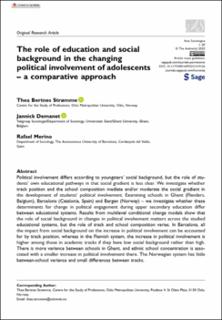The role of education and social background in the changing political involvement of adolescents – a comparative approach
Peer reviewed, Journal article
Published version
Permanent lenke
https://hdl.handle.net/11250/3116089Utgivelsesdato
2023Metadata
Vis full innførselSamlinger
- Publikasjoner fra Cristin [3269]
- SPS - Documents [424]
Originalversjon
10.1177/00016993231219126Sammendrag
Political involvement differs according to youngsters’ social background, but the role of students’ own educational pathways in that social gradient is less clear. We investigate whether track position and the school composition mediate and/or moderate the social gradient in the development of students’ political involvement. Examining schools in Ghent (Flanders, Belgium), Barcelona (Catalonia, Spain) and Bergen (Norway) – we investigate whether these determinants for change in political engagement during upper secondary education differ between educational systems. Results from multilevel conditional change models show that the role of social background in changes in political involvement matters across the studied educational systems, but the role of track and school composition varies. In Barcelona, all the impact from social background on the increase in political involvement can be accounted for by track position, whereas in the Flemish system, the increase in political involvement is higher among those in academic tracks if they have low social background rather than high. There is more variance between schools in Ghent, and ethnic school concentration is associated with a smaller increase in political involvement there. The Norwegian system has little between-school variance and small differences between tracks.

